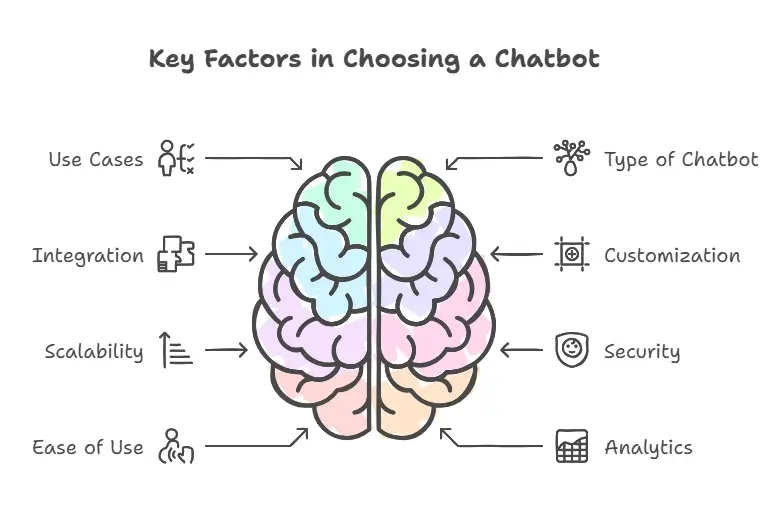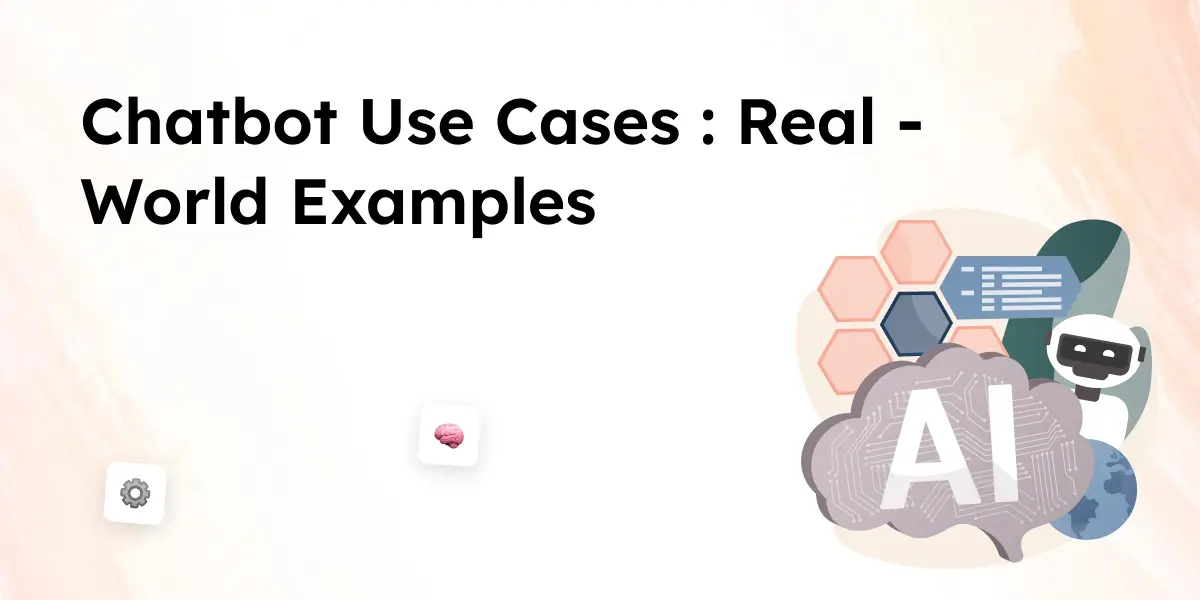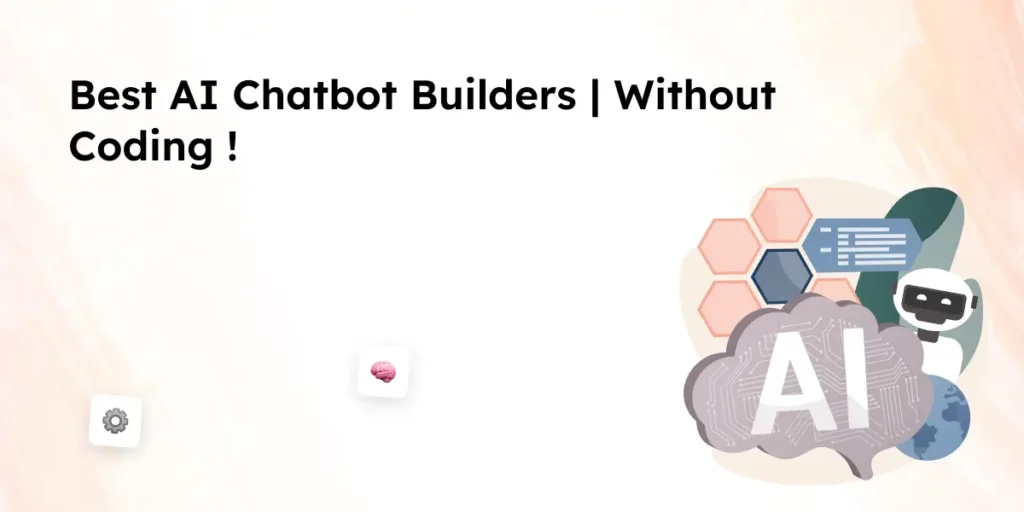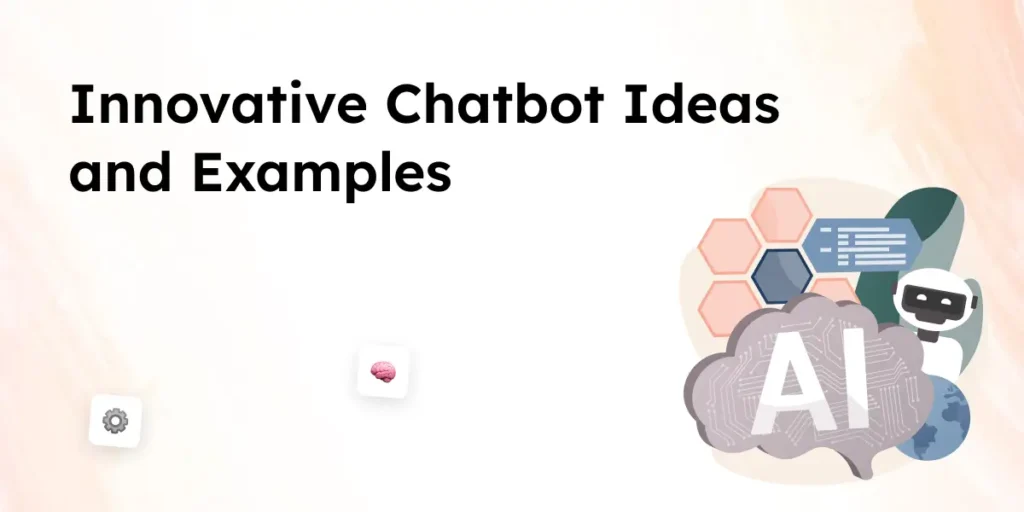Chatbots are transforming customer service by automating tasks, improving customer engagement, and handling queries efficiently. Advances in AI, natural language processing, and machine learning have made AI chatbots smarter, enabling businesses to personalize interactions and enhance the customer journey.
This article explores the best chatbot use cases across industries, from eCommerce to healthcare, highlighting how companies can deploy chatbots to streamline operations and boost customer satisfaction. By the end, you’ll understand how chatbots can be integrated into different industries and find the right chatbot for your business needs.
What is a Chatbot?
A chatbot is a computer program that simulates conversations to automate customer interactions and improve customer service. Businesses use AI-powered chatbots to handle queries, enhance engagement, and personalize responses using natural language processing and machine learning. There are different chatbot types, including rule-based and AI chatbots, each serving specific business needs. Companies deploy chatbots across industries to improve efficiency, reduce workload, and provide instant support.
Key Points:
- Chatbots provide automated responses to customer queries, improving response times.
- AI chatbots use conversational AI and machine learning for smarter interactions.
- Businesses use chatbots for customer support, lead generation, and automation.
- A chatbot can be integrated into websites, messaging apps, and support systems.
Benefits of Chatbots for Businesses
Chatbots provide several advantages for businesses looking to enhance customer service, automate repetitive tasks, and improve customer engagement. With AI-powered chatbot technology, companies can handle large volumes of queries, reducing the workload on human agents while improving customer satisfaction. Businesses across industries use chatbots to streamline processes, enhance personalization, and optimize the customer journey.
Improve Customer Support Efficiency
- Chatbots can answer common customer queries instantly, reducing wait times.
- AI-powered chatbot applications ensure quick resolutions for frequently asked questions.
- Teams use chatbots to help manage high support volumes without additional staffing.
Enhance Customer Engagement and Personalization
- Chatbots can be used to build customer profiles based on interactions.
- AI chatbots personalize responses using natural language processing and machine learning.
- A chatbot can provide tailored product or service recommendations to improve customer satisfaction.
Automate Repetitive Tasks and Reduce Costs
- Chatbot software automates appointment scheduling, order tracking, and support queries.
- Businesses use AI chatbots to reduce manual workload, allowing human agents to focus on complex tasks.
- Deploying a chatbot lowers operational costs while maintaining quality customer interactions.
Boost Sales and Lead Generation
- eCommerce chatbot applications assist in product recommendations and cart recovery.
- Chatbots provide instant responses, increasing conversions and customer trust.
- AI-powered chatbots qualify leads by collecting customer data and answering pre-sales questions.
Improve Customer Experience and Accessibility
- Chatbot interactions ensure 24/7 availability, helping customers anytime, anywhere.
- A virtual assistant provides real-time assistance across multiple channels.
- AI chatbots support multiple languages, improving accessibility for global audiences.
With chatbot use cases expanding in different industries, businesses can utilize chatbot technology to enhance workflows and deliver seamless customer experiences. Whether it’s customer service, eCommerce, healthcare, or finance, chatbots can also help businesses automate and scale operations efficiently.
25 Best Chatbot Use Cases in 2025 Across Industries
Chatbots are transforming customer service and business operations across industries. From handling customer queries to improving customer engagement, AI-powered chatbots offer efficient solutions for businesses of all sizes. Below are 25 best chatbot use cases in different industries, showcasing how chatbot technology is streamlining processes and enhancing customer interactions.
1. Chatbot Use Cases in Customer Support & Service
- Handling FAQs and Reducing Ticket Volume
- A chatbot can answer repetitive customer queries, reducing the load on support agents.
- AI chatbots provide instant, accurate responses to improve customer satisfaction.
- Real-Time Troubleshooting and Support
- Conversational AI helps diagnose technical issues and provides step-by-step solutions.
- Chatbots can be integrated with knowledge bases to guide users through troubleshooting.
- Managing Refunds and Order Tracking
- Chatbots provide real-time updates on order status, shipping details, and return policies.
- Customers can use chatbots to initiate refund requests without contacting a human agent.
- Appointment Booking and Scheduling
- Businesses deploy a chatbot to automate appointment setting for services like healthcare and consulting.
- A chatbot can ask for user preferences and suggest available time slots.
- Multilingual Customer Support
- AI-powered chatbots provide customer support in multiple languages, improving accessibility.
- Businesses use AI chatbots to enhance global customer engagement without hiring multilingual agents.
2. Chatbot Use Cases in eCommerce
- Personalized Product Recommendations
- Chatbots provide tailored product suggestions based on browsing history and preferences.
- A chatbot can be integrated with an eCommerce store to drive conversions.
- Cart Recovery and Abandoned Checkout Assistance
- Chatbot software detects abandoned carts and reminds customers to complete their purchase.
- AI chatbots offer discounts or answer last-minute product queries to increase sales.
- Post-Purchase Support and Order Updates
- Chatbots provide order confirmations, shipping details, and expected delivery times.
- Customers can use chatbots to track orders and request modifications.
- Upselling and Cross-Selling with AI Chatbots
- A chatbot could suggest complementary products or upgrades during a purchase.
- Conversational AI increases order value by offering relevant recommendations.
- Handling Customer Returns and Exchanges
- Chatbot technology simplifies the return process by guiding customers through steps.
- AI chatbots provide instant refund status updates to improve customer experience.
3. Chatbot Use Cases in Healthcare
- Symptom Checking and Self-Diagnosis
- A healthcare chatbot assists users in identifying symptoms and suggesting next steps.
- AI-powered chatbot examples include virtual assistants for basic health assessments.
- Appointment Scheduling for Patients
- Patients can use AI chatbots to book medical consultations without human assistance.
- Healthcare chatbot software integrates with hospital systems to manage scheduling.
- Medication Reminders and Health Tracking
- Chatbots provide automated alerts for prescription refills and medication intake.
- AI chatbots collect patient data to track long-term health progress.
- Post-Treatment Follow-Ups
- Chatbots can also help monitor patient recovery by sending follow-up messages.
- AI chatbot technology ensures patients receive guidance after hospital visits.
- Mental Health Virtual Assistant
- A chatbot can provide support for stress, anxiety, and mental well-being.
- Conversational AI offers resources for mindfulness and self-care.
4. Chatbot Use Cases in Finance & Banking
- Fraud Detection and Security Alerts
- AI chatbots analyze transaction patterns and notify users of suspicious activity.
- Chatbot interactions help customers take immediate action to secure accounts.
- Loan Application Assistance
- Customers can use a chatbot to check eligibility and apply for loans.
- AI-powered chatbot applications guide users through financial documentation.
- Expense Tracking and Budgeting
- Chatbots provide insights on spending habits and savings goals.
- A chatbot can also help users set financial reminders and track bills.
- Personalized Investment Advice
- Chatbots provide market updates and suggest investment opportunities.
- AI and machine learning help tailor financial recommendations.
- Automating Customer Verification
- AI chatbot technology streamlines identity verification for secure banking transactions.
- Chatbots can ask for authentication details and guide users through security checks.
5. Chatbot Use Cases in Other Industries
- HR Chatbots for Employee Onboarding
- Businesses use chatbots to help new hires complete paperwork and training.
- AI chatbot technology answers HR-related queries instantly.
- Education and E-Learning Support
- AI chatbots assist students by providing course information and study materials.
- A chatbot can answer frequently asked questions about assignments and deadlines.
- Travel and Hospitality Assistance
- A chatbot is available to help travelers with booking flights, hotels, and rentals.
- Chatbots provide instant travel updates and itinerary suggestions.
- Customer Feedback Collection
- Companies use chatbots to collect customer feedback and improve products or services.
- AI-powered chatbot interactions encourage users to leave reviews and suggestions.
- Real Estate Chatbots for Property Inquiries
- Chatbots provide property details, pricing, and availability to prospective buyers.
- AI chatbot applications can schedule home viewings and answer mortgage-related queries.
Chatbot use cases in different industries continue to evolve as AI technologies advance. Businesses can now use AI chatbots to automate workflows, enhance customer interactions, and provide real-time assistance. Whether you’re looking for chatbot examples in customer service, eCommerce, healthcare, or finance, the best chatbot use cases demonstrate how AI is reshaping customer experiences.
How to Choose the Best Chatbot for Your Business

With so many chatbot applications available, selecting the right chatbot for your business needs requires careful consideration. A chatbot can be integrated into various platforms, including websites, messaging apps, and customer support systems. The right chatbot should align with your goals, whether it’s improving customer service, automating repetitive tasks, or enhancing customer engagement.
Define Your Chatbot Use Cases
- Identify the primary reason you want to deploy a chatbot.
- Consider chatbot use cases across industries to see how businesses in your sector utilize AI chatbots.
Decide Between Rule-Based and AI-Powered Chatbots
- A rule-based chatbot is ideal for handling simple queries with predefined responses.
- AI-powered chatbots use natural language processing and machine learning to improve customer interactions.
Integration with Existing Systems
- Ensure the chatbot can be integrated with your CRM, help desk, or eCommerce platform.
- A chatbot project should work seamlessly with your business workflow.
Customization and Personalization Features
- The chatbot should be able to personalize responses based on user data.
- AI chatbots can provide personalized recommendations, improving customer satisfaction.
Scalability and Flexibility
- Businesses should choose chatbot technology that scales as customer queries increase.
- A chatbot should be able to handle multiple interactions across industries.
Security and Compliance
- If handling sensitive data, ensure the chatbot meets industry security standards.
- AI chatbot applications in finance and healthcare should follow regulatory guidelines.
Ease of Setup and Management
- A no-code chatbot builder allows businesses to deploy a chatbot without extensive technical expertise.
- Businesses looking to set up a chatbot quickly should choose chatbot software with user-friendly tools.
Analytics and Performance Tracking
- The chatbot should provide insights into user behavior and chatbot interactions.
- AI tools should offer real-time data on customer queries and chatbot efficiency.
Choosing the right chatbot can make a significant impact on business efficiency, customer experience, and automation. Companies looking to find a chatbot should evaluate chatbot software that aligns with their industry, customer needs, and growth goals.
Conclusion
Chatbots are now essential for automating customer service, improving engagement, and optimizing business operations. AI-powered chatbots enhance customer support, automate tasks, and provide real-time assistance across industries like eCommerce, healthcare, and finance. As chatbot technology evolves with AI and machine learning, businesses adopting conversational AI and personalized chatbot interactions will gain a competitive edge.
Investing in the right chatbot software can improve customer interactions, reduce costs, and streamline workflows, making chatbots a valuable tool for businesses in 2025 and beyond.
Frequently Asked Questions (FAQ)
1. What is a chatbot, and how does it work?
A chatbot is a computer program designed to simulate human-like conversations using natural language processing and machine learning. Businesses use chatbots to help automate customer interactions, handle queries, and improve customer service efficiency.
2. How can chatbots improve customer support?
Chatbots can provide instant responses to customer queries, reducing wait times and freeing up human support agents for more complex issues. AI chatbots also ensure 24/7 availability, helping businesses improve customer satisfaction.
3. What are the benefits of chatbots for businesses?
Some key benefits of chatbots include:
Automating repetitive tasks to reduce workload
Enhancing customer engagement through personalized interactions
Assisting with lead generation and customer journey optimization
Reducing operational costs while improving customer support
4. What are some common chatbot use cases?
Businesses use chatbots across industries for various applications, including:
Answering FAQs and troubleshooting issues
Managing customer service requests and ticketing
Providing eCommerce chatbot product recommendations
Automating appointment scheduling in healthcare



